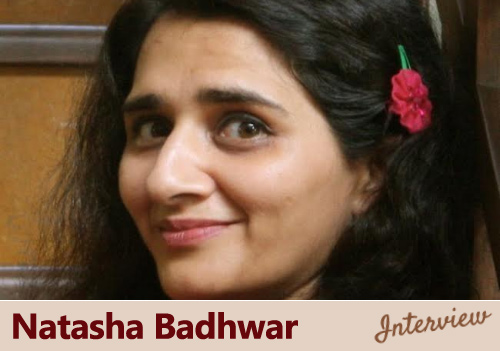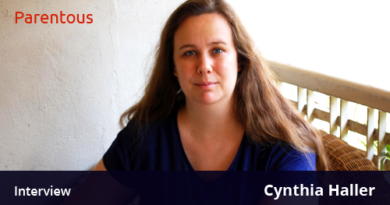Interview With Ilham Modi Bharmal, Emotional Intelligence Coach
Do you as a parent sometimes wonder how your little one will face this harsh, wicked world? In today’s interview we speak to someone who works towards preparing kids, parents and teachers to deal with challenges while keeping a positive outlook towards life. Meet Ilham Modi Bharmal, Emotional Intelligence Coach, Trainer & Consultant, crocheter and mother of two.
Q: Tell us about yourself , your background, your professional pursuits and interests, any hobby or secret superpower that no one knows about.
Having grown up as the youngest of three children, I had a challenging childhood. We had to flee a fairly comfortable life in Kuwait to escape the tensions of the Gulf war. My parents rebuilt a home and a career in Mumbai. Despite all challenges, they had a common mission to raise us with good values. On a micro level, I also had to deal with youngest sibling issues. I was a shy girl with a lot of silent ideas and the ability to work hard was my only talent. Even today, that is the only approach I still have towards anything in life.
A crazy passion to immerse myself in anything I set my eyes on, has lead me to become an enthusiastic over-achiever of sorts. It was always about learning and working hard to learn better. Be it dance, dramatics, singing, crocheting, cooking or reading, I’ve relished in absorbing it all.
Q: Can you tell us about your journey so far?
My only mission is to learn. Each time I feel the hunger for knowledge, I jump straight into the field of interest and devour it with glee. I’ve also, subconsciously, combined my life stages with the acquisition of new knowledge. During my youth, I attained a double post-graduation in Commerce and an MBA. In the years before my marriage I worked at the Human Resources division at Ogilvy & Mather and then attained a Post-Graduation in the field of Psychology. I also enjoyed working as a visiting faculty at a few colleges then. Before parenthood, I attained a Bachelor’s Degree in Early Childhood Education. Today, I’m a Trainer and Consultant with myNEST, the preschool that my first born studied at. Just before my second-time parenthood, I picked up a new craft. I taught myself how to crochet and worked so diligently at it, that when I set up a tiny stall of my craft venture – Roses and Raindrops – the response was fabulous. Today, I am an Emotional Intelligence Coach, guiding children parents and working professionals on emotionally intelligent practices.
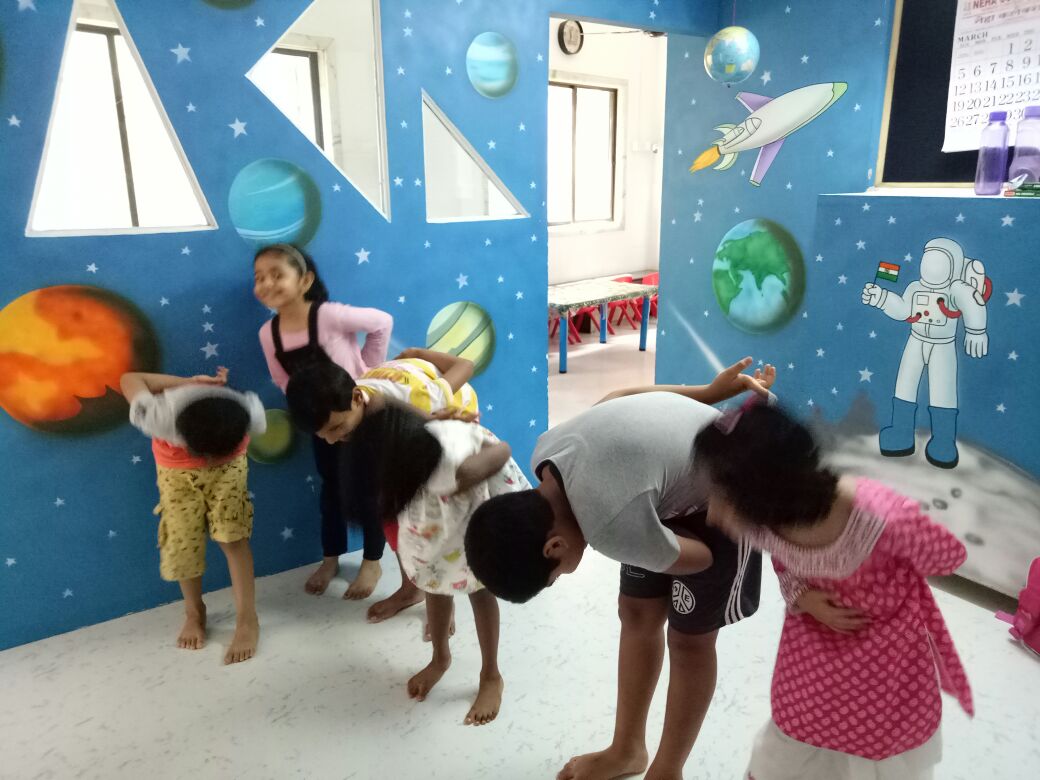
Q: Please explain what is Emotional Intelligence and why it is important.
Emotional intelligence is not a concept, it is actually a way of life. It has been practiced daily by our forefathers. Somehow, many of us lost touch with this amazing element because of our focus on developing the competitive Intelligence Quotient (IQ). Emotional Intelligence is basically about knowing, understanding and managing feelings of self and of others. We are emotional beings by nature. What has, however, been forgotten, is the art of managing these emotions. We have also rusted our skills on feeling for others- Empathy. My EQ knowledge transfer sessions are just well-delivered reminders of what we are actually meant to do, as human beings. The confusion and competitiveness caused by the IQ race has made EQ training all the more relevant in our times. The happier people are the ones with a higher emotional quotient. EQ is the new IQ.
Q: Your children’s workshop ‘The Drama Express’ sounds quite interesting. Can you give more details?
The Drama Express is born out of my multiple interests and passions, rolled into one module. A unique set of twenty sessions that help children to learn the nuances of speech and dramatization techniques, while also learning how to be emotionally intelligent. Each exercise has been designed to provoke expression of feelings, sharing thoughts and ideas, empathising with others and managing emotions even as the child learns the finer art of external performance. Self-assured and emotionally intelligent children will automatically express better and be better performers. My vision is to create an environment where children perform that much better on a platform, because they feel that much better about themselves.
Q: This is an entirely new concept that you have designed right from scratch. What went into the ideation, curriculum design, planning and execution?
Yes, The Drama Express for the emotionally intelligent child, is born out of my mind. If you really come to think of it, children are never going to be excited about “EQ for children” sessions! So, I went back to the ideation board and drew inspiration from my own childhood interest areas. My love for drama had grown with me from school right into college and later a theater group after college. The big idea emerged again. This time, I thought of combining speech and drama for children with EQ training. I work on their outside performance elements by indulging in exercises on body language, voice modulation, intonation, diction and pronunciation. They’ve also turned into script and dialogue writers as part of these unique sessions.
We indulge in several fun games that teach them how to express their feelings (even negative ones), to talk, to help friends and to feel for another person. It’s a mixed bag of work on the outside and inside, of each child’s persona. Pretence (except when we are actually acting) and judgmental attitude don’t find a place in our class. It is our happy place. It is my Nirvana.
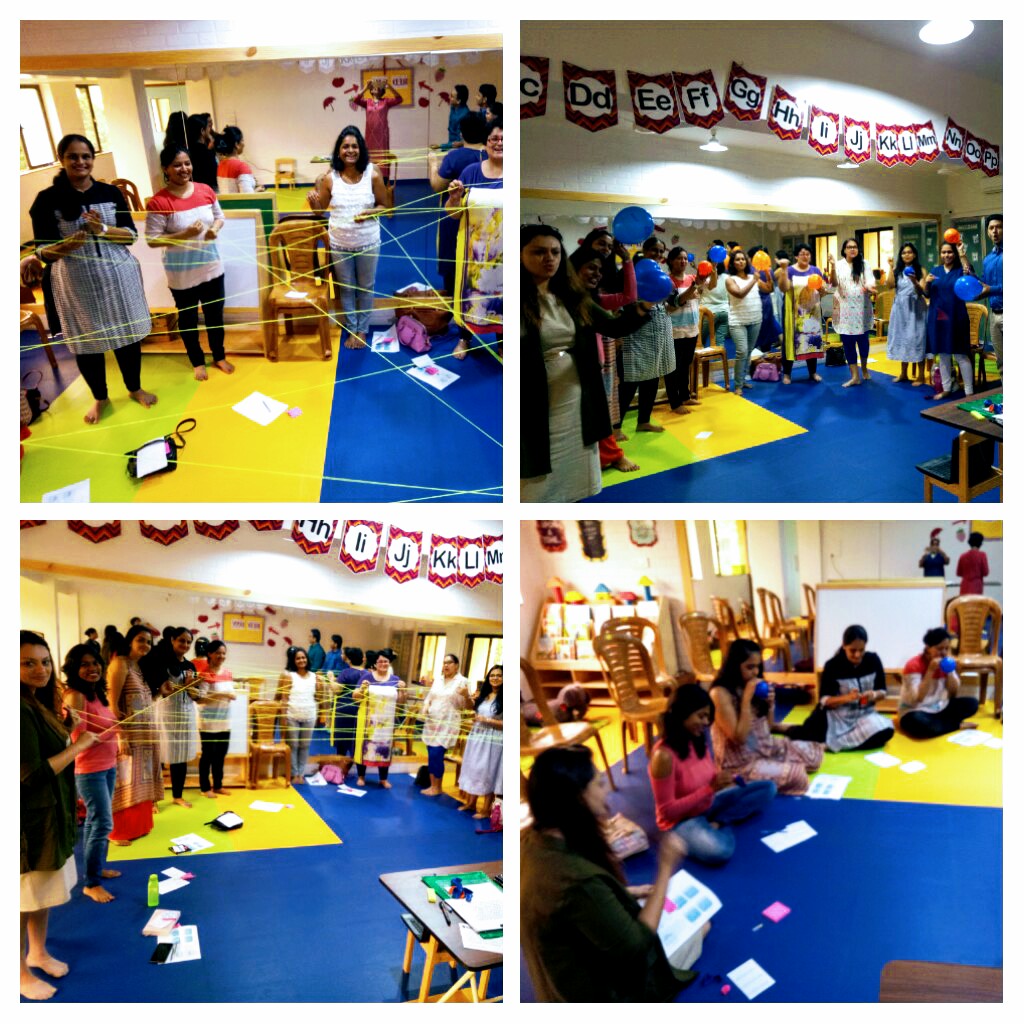
Q: Can you tell us about the ‘EQ is the new IQ’ workshops you conduct for parents?
The race to raise children who are constantly http://www.texasgoldengirl.com/paxil/ achieving new heights, has gained great momentum in the last few generations. So many parents are determined to make a prodigy out of their perfectly average children. Those who haven’t made any noticeable breakthroughs are trying even harder to get there. Why then are so many of our little smart ones growing up to become victims of depression, relationship issues, anxiety and loneliness? Perhaps, in the pursuit of IQ, we forgot to teach children how to accept and appreciate others, understand emotions and manage these feelings. We are part of and raising a generation that is smart, with less of a heart.
Q: This generation is quite aware as parents. They actually listen to their children’s needs and understand their standpoint well. Why is emotional intelligence still of significance then?
You are absolutely right when you say that this generation of parents is a lot more involved in the lives of their children. However, a lot of us teach our children to become “smarter” and “better” than the others. We want our children to only have positive experiences with positive outcomes. Early success and recognition is the new mantra. Teenagers are founders of startups. CEOS are sprouting out in their 20’s. As these children grow up, they will face the reality that we cannot have everything in life.
If and when these kids fail, the bubble bursts. Childhood achievements become glories of the past. Negative thoughts and feeling begin to emerge. The parent now has less control over the grown up child. For both parent and child, this is the time to build some EQ awareness.An emotionally sound child has learnt that negative feelings can be eventually overcome. It’s a natural skill we possess. We need to teach our children to wait for things, feel for friends and , understand others.
Q: What is a day in the life of Ilham Modi Bharmal, the mother, life-skills trainer, professor and crocheter?
Each day is an action packed one. With both my children going to school, though at different timings, I play the pick-up and drop game four times each day. The afternoons are my work-time. I build more exercises for upcoming workshops and study diligently for my weekend lectures. Any new idea that comes to my mind gets noted down during these precious golden hours of noon. . When the kids are back, time is spent in nurturing their bodies with food and souls with talking and playing. We sing and dance to catchy kiddie rhymes on most evenings. My husband is a Merchant Marine Officer and travels extensively. I try to keep things balanced at home, by actually not trying too hard.
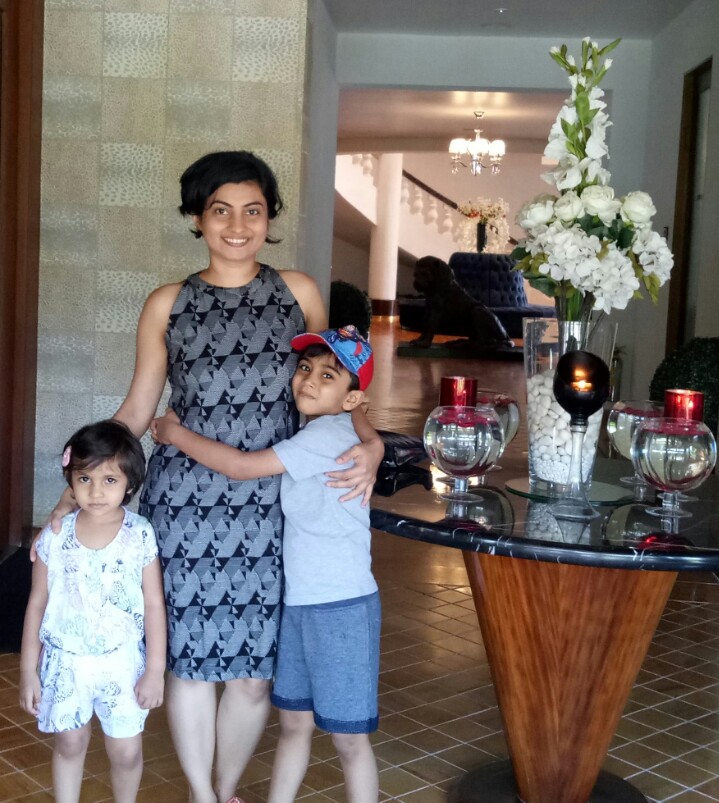
Q: Answer in one word- What would you like your children to remember you as?
Hardworking
Q: We’re sure it is a fulfilling experience to interact with people, kids and be part of their journey of growth. Can you tell us a special episode that has stayed?
Many small instances happen every few days or so. Moms of teenagers come back saying how much they’ve benefited from the workshop. Young moms of children in my speech and drama class speak about the improvement in their child.
A very special episode is connected with the Early Childhood Education Centre where I’m engaged as a consultant and trainer. During one of my training sessions, I asked them for a wall which was very graciously cleaned and granted. Over the course of that month’s training, I introduced the teachers, attendants, management and administrative staff of the school to the fun art of doodling and opened up the wall for them to fill up. The theme for the Doodle Wall was “My Childhood”. The empty white wall started filling up.
On orientation day, parents were also invited to fill up the remaining portions of the wall. The project attracted a lot of attention from everyone and was well-lauded. The initial plan to whitewash the wall once the exercise was over was dumped and a unanimous decision was made to let it remain. I literally left my mark here. Supporting my idea of the Doodle Wall was the schools way of showing their faith in my work.
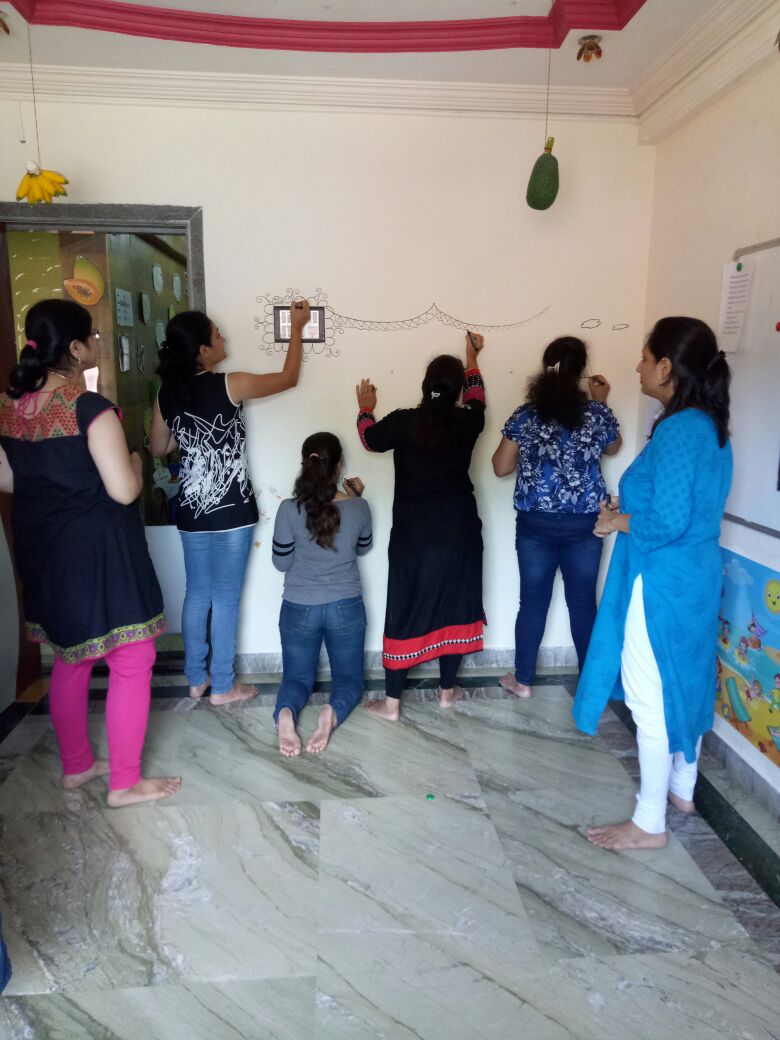
Q: How has being a parent influenced your life? What have you learnt about yourself after becoming a parent?
Until I became a mother, I did not know what it meant to be busy. I now realise that not everything we do can produce visible results immediately. Children need years of nurturing and guidance before they finally imbibe the values we are trying to teach them. I’ve also learnt to understand that children are mirrors. They catch every minute detail of our behaviour. It all comes back, I believe. Parenting has taught me that we can gracefully balance many roles on one plate if we really want to. All it takes is an undying passion and pure hard work.
Q: How can we all be more aware emotionally with those around us? Any golden rules that you live by and would like to share with other parents in our community?
Empathy is an important element of emotional intelligence. Also, mastering the art of managing ones feelings is much needed around us. For those people who are kind and understanding of the people around, there will always be a positive vibe surrounding them. They will find it easy to handle the negativity of others. IQ may contribute to success. But that success may not sustain in the absence of EQ.
Hope you liked reading the interview and Ilham’s views on importance of nurturing the emotional intelligence within your children. Let us know your thoughts in the comments section below.

